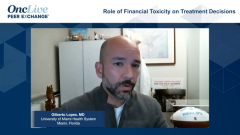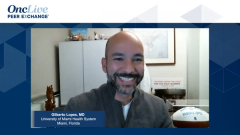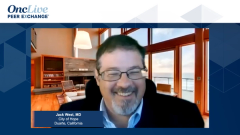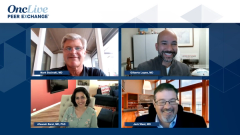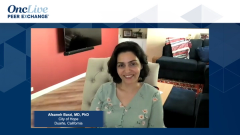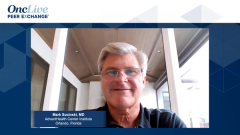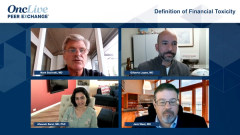
Definition of Financial Toxicity
Jack West, MD, Gilberto Lopes, MD, and Afsaneh Barzi, MD, PhD, provide a definition for financial toxicity.
Episodes in this series

Mark Socinski, MD: Hello. Welcome to this OncLive® Peer Exchange titled, “Balancing Innovation and Drug Pricing in Global Cancer Care.” I’m Dr Mark Socinski. Joining me today in this discussion are my colleagues, Dr Gilberto Lopes, from the University of Miami Health System in Miami, Florida; Dr Afsaneh Barzi, from the City of Hope in Duarte, California; and Dr Jack West, from the City of Hope. Today we are going to discuss a number of topics pertaining to how we can best balance the use of innovative cancer therapies with disruptive drug pricing, to make therapies more available to patients worldwide. We’ll also be looking specifically at EGFR-targeted therapies, as well as PD-1– or PD-L1–directed treatments to identify best practices for optimizing drug development and cost effectiveness to advance global health care. Let’s get started on our first topic. I decided I would pick on my good friend Jack West to set the stage. This isn’t a topic that we are necessarily experts in—and if I’m insulting any of my colleagues by saying that, please correct me—but it’s something we all deal with, as physicians who see patients on an ongoing basis. Jack, what do you think about this term financial toxicity, what does it mean to you, and why should we be discussing it?
Jack West, MD: Financial toxicity, I think, is a term that has only come up in the last few years, but it’s a topic that should be considered “where have you been all my life” because as the cost of our drugs, specifically for cancer, have escalated over the past several years, or decade or two, that potentially has a negative impact on people’s quality of life because of the cost of the treatment itself. We are used to thinking of toxicity in terms of nausea, vomiting, or diarrhea, etc, but truthfully, when you have drugs that cost potentially thousands of dollars per month, that may be forcing patients to make tough choices about what treatment they have to do without, and that in itself impairs quality of life. I would say what’s also relevant is that financial toxicity is borne not just by the patient and their family, but by broader society. So some of these issues are not limited to our conversation in the exam room, but have an impact in terms of raising the cost of health insurance premiums for people who can ill afford them and are struggling to pay for basic necessities, such as heat and food, medicines, and things like that. When costs increase 5% or 10% every year for health insurance for a family, that’s a real impact. We need to choose wisely in terms of treatments that provide value, not just in terms of the patient in front of us, but for the many people we can’t see. Especially if we’re raising the cost of treatment for other people or choose not to fund other things, whether that’s prenatal care for people or roads and schools, but something has to give, and the cost of therapies needs to become part of the equation.
Mark Socinski, MD: Afsaneh, what’s your perspective?
Afsaneh Barzi, MD, PhD: I think the term financial toxicity was coined in 2009, and the reason “toxicity” was put into the name was to draw the attention of oncologists. We all know that we call adverse effects toxicity, so in order to make the name align with how we name and use this to bring attention to it, and to make it part of our routine, that name was created. I agree with Jack that it is an important concept that we have to think about. Unfortunately, we don’t have any control over it. None of us, as oncologists, set drug prices, nor prices for other practices we do. Beyond that, it’s not the patient, the consumer of our services; they’re not in control of that. Price is dictated by an insurance industry that has its own direction in terms of choosing, selecting, or reimbursing the cost. Is it important? Yes, very important and relevant to diversity, and to health equity around the world and in the United States. I think the term toxicity is used to draw attention to oncologists—this is a common term for us.
Mark Socinski, MD: Gilberto?
Gilberto Lopes, MD: I agree. I think that was the genesis of calling it financial toxicity. We’ve been doing health technology assessments and looking at the costs and specific clinical benefits of interventions for decades. Jack has done some of it, and I have also done a number of different analyses, in terms of cost effectiveness, budget, etc, for research. But the term financial toxicity brings it to the realm of our patient-physician relationship, and that brings forth the issue that some of our patients cannot afford a number of our newer therapies that have changed the way we treat cancer and have changed the lives of our patients. We have to remember that treatment cost can have an impact on finances, and that health care issues are the most common cause of bankruptcy for individuals in this country [the US]. While I agree that we don’t have direct control, we as oncologists have a huge role. We can see examples, for instance, when our colleagues at Memorial Sloan Kettering Cancer Center decided they weren’t going to use aflibercept, that pretty much killed the drug in the United States. I’m not a GI [gastrointestinal] oncologist any longer, but that’s one example where having the bully pulpit made all the difference. We have that power, and we are the ones who should be informing society so we can have honest discussions and debates about this issue.
Transcript Edited for Clarity


